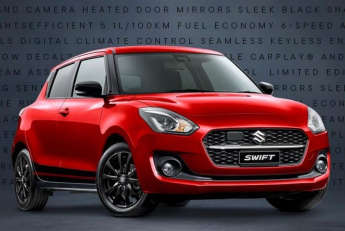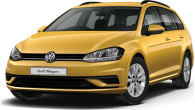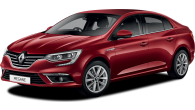For all the big talk on electric vehicles, hybrids are still where the hearts and minds of Australian buyers are.
Suzuki’s cashing in on this wave of hybrid popularity by slapping a ‘hybrid’ badge on the back of its popular Swift small car, but don’t be fooled. This isn’t a ‘hybrid’ in quite the same way as a Toyota, MG or Hyundai.
This is a car which brings into question what a hybrid even is, and if it achieves its goal of shaving litres off your fuel bill, does it even matter if Suzuki bends the rules a little bit?

Follow me on my long-term journey with the Swift to find out.
What is the price of the Suzuki Swift Hybrid in Australia?
It’s always good to start with price tags, so we know what we’re up against and what else might be worth considering.
The car we picked up is a Swift GLX which for now is the top-of-the-range variant. It wears a price-tag of $27,990, before on-road costs.
It might surprise you to learn this new GLX is more affordable than the previous version by about $1800, but there’s a good reason for that.
.jpg)
You see, the old GLX scored a more powerful engine than the rest of the range, a punchy little three-cylinder turbo, while this new version gets the same 1.2-litre hybrid set-up as the base version.
I’m not going to lie, it’s a disappointment in some ways, but we’ll get to that later, along with how the new Swift is only allegedly a hybrid. Let’s talk about rivals first.
If we’re sticking to hybrids only, there are just two options. The venerable Toyota Yaris (although a base Ascent Sport is even more expensive than our top-spec Swift, at $28,500) and the newcomer MG3 Hybrid which can be had from an identical $27,990 for a base Excite.
Having driven both of these alternate options, I can tell you they feel a bit more premium than the Swift, and they’re more ambitious with their hybrid systems.
Standard kit includes a set of 16-inch alloys, a 9.0-inch multimedia touchscreen with wired Android Auto and wireless Apple CarPlay, a wireless phone charger, a set of LED headlights, electric heated folding door mirrors, a leatherbound steering wheel and so-called ‘premium fabric’ seats, type A and C USB ports (but only the type A does phone mirroring), rear parking sensors and camera, as well as keyless entry with a push-start ignition.
.jpg)
It even has some stuff not normally seen in this class like heated front seats. Suzuki clearly knows the included items on this car will need to do some heavy lifting to fight off the likes of MG, and the Swift delivers.
On top of that, there's a reasonably well equipped safety suite, but this is now an awkward topic for this car in areas we’ll explore in a later chapter.
Is the Suzuki Swift Hybrid well designed?
The new Swift adopts a bit of a chunky new look from the outside with some modern touches. In my opinion, the previous car was more resolved with this one looking a bit pieced together. But this hasn’t stopped it from being instantly identifiable as a Swift thanks to its curvaceous windscreen and boxy descending cabin roofline.
The rounded bonnet and light fittings have a mild UFO vibe, while the rear lights help to accentuate the width of the car.
.jpg)
My first impressions of the interior are one of chaos. While the previous two versions of the Swift have had a pleasingly symmetrical design, this new one feels all-over-the-shop, with a wild mix of angles, colours and textures.
The pieced-together feel ramps up, too, with the multimedia screen sitting in an enormous gloss black frame like an early flatscreen TV.
The previous car's cutesy round vents have been replaced by more serious fittings which slot into the new dash design, while the instrument cluster remains an old-school analogue dial unit, where most rivals are going full digital.
.jpg)
Needless to say, I miss the more consistent look of the old car, but haphazard look and feel aside, there are definitely major upgrades here.
For one, the Swift continues to use physical toggles and buttons and even an independent dot-matrix screen for the climate controls, which is much appreciated in this era. And while the screen looks a little out-of-place, it's a massive upgrade in quality and speed over the one in the outgoing model.
The chunky steering wheel has all the right buttons, and the seats are quite a strong point for this car, with nice bolstering, attractive pattern work and comfy foam internals.
Is the Suzuki Swift hybrid practical?
With low seats and a tall roof, the Swift might surprise you with how well it can accommodate four adult occupants. It feels like it could easily rival many small SUVs up front in terms of headroom and visibility, although storage is an ongoing issue.
With no armrest console box or bridge-style centre console, there’s not much space for loose objects. This is becoming a particular irritation for me in my daily duties with this car.
.jpg)
There is a wireless phone charger under the climate unit, but if you have a water bottle in the front cupholders, it’s impossible to access.
If you’ve got a bottle and some loose objects up front with your phone in the charger, the only other space for storage is the door pockets (which aren’t huge) or the passenger footwell if you’re riding solo.
It is the first car I’ve had in a while where I run out of storage space up front on the regular. Worth keeping in mind, particularly for object-laden family buyers thinking of rolling the dice on something city-sized.
The rear seat is pretty barren too, offering a simple foam bench, although it offers adequate headroom and legroom behind my driving position at 182cm tall.
.jpg)
The boot is slightly larger than the outgoing car, too, at 265 litres, but it is also not enormous. I’ll explore this more in my second chapter where we take this diminutive hatch on a coastal road trip.
Is the Suzuki Swift Hybrid self-charging?
Yes, but if you were hoping for a Toyota-style hybrid transaxle with its signature smooth electric take-off, you might want to look elsewhere.
You see the Swift ‘Hybrid’ isn’t a real hybrid in the way CarsGuide normally defines it. To be defined as a hybrid, we want to see an electric motor which is capable of driving the wheels under its own steam, even temporarily.
Instead the Swift Hybrid is a mild-hybrid (MHEV), replacing the usual alternator and stop/start system with an integrated starter generator (ISG) which has an electric motor capable of producing just 2.3kW/60Nm.
This adds to the Swift’s new 1.2-litre three-cylinder engine which can produce 61kW/112Nm. On paper, hardly inspiring stuff, and certainly not a ‘real hybrid’ in the traditional sense.
Because the motor can’t drive the wheels, simply tipping in its tiny amount of extra power where it can, the new Swift feels more like a traditional combustion hatch to drive.
.jpg)
The thing is, based on the fuel consumption numbers we’re seeing, does it really matter if it gets to the same goal? By reducing weight and complexity, the Swift’s claimed fuel consumption is almost on-par with a real hybrid Yaris which costs significantly more ($28,500 before on-roads).
What is the Suzuki Swift Hybrid’s fuel economy?
On paper this CVT automatic GLX version should be doing 4.0L/100km though the beauty of these long-term tests is seeing what we get when we have the car for a long period of time.
In our first month with the Swift it spent most of its time in stop-start traffic and expressway driving, and over nearly 600km of this it produced a figure of 4.9L/100km.
It’s not as good as the official claim, and not as good as the Yaris Hybrid I tested back in 2023 in which I hit 3.8L/100km. However, it’s going to take a while for the 1.1L/100km to pay itself off if you pick the more expensive Toyota.
.jpg)
Next month we’ll load the Swift up and take it on a longer journey to see how freeways might affect its 'hybrid' drivetrain, and we’ll comment a little more on what it’s like to drive on freeways and curvy stuff, so keep an eye out for that.
Acquired: February 2025
Distance travelled this month: 566km
Odometer: 5022km
Average fuel consumption this month: 4.9L/100km
Suzuki Swift 2025: Hybrid Glx
| Engine Type | Inline 3, 1.2L |
|---|---|
| Fuel Type | Unleaded Petrol/Electric |
| Fuel Efficiency | 4.0L/100km (combined) |
| Seating | 5 |
| Price From | $29,490 |
| Safety Rating |
|
Pricing Guides

Range and Specs
| Vehicle | Specs | Price* |
|---|---|---|
| Glx (Qld) | 1.0L, Unleaded Petrol, 6 SPEED AUTOMATIC | $29,790 |
| Glx Shadow | 1.0L, Unleaded Petrol, 6 SPEED AUTOMATIC | $32,490 |
| Glx Turbo | 1.0L, Unleaded Petrol, 6 SPEED AUTOMATIC | $29,790 |






.jpg)

.jpg)
.jpg)

























.png)
.jpg)



